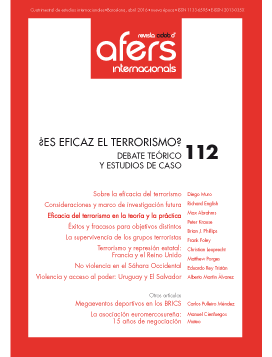Introducción. ¿Es eficaz el terrorismo?
Paraules clau:
terrorismo, violencia política, eficacia, estrategia, táctica, antiterrorismoResum
Revista CIDOB d’Afers Internacionals, nº 112
Cuatrimestral (enero-abril 2016)
ISSN:1133-6595 | E-ISSN:2013-035X
DOI: https://doi.org/10.24241/rcai.2016.112.1.7
La cuestión de la eficacia del terrorismo es de gran relevancia política para los perpetradores, las víctimas y la sociedad en general. Evaluar la eficacia de la violencia política requiere analizar con detalle la gama de objetivos de los grupos terroristas y distinguir entre los niveles estratégicos y tácticos. Si bien la mayoría de las organizaciones clandestinas no logra alcanzar sus objetivos a largo plazo, sí consigue algunos éxitos durante el proceso. La capacidad del terrorismo para producir los efectos deseados dependerá también de otras variables y parámetros contextuales. El éxito táctico y estratégico de una campaña violenta depende de: 1) la capacidad y la fuerza de los perpetradores; 2) el tipo de objetivos, y 3)la capacidad y la resistencia de la sociedad objetivo. Este artículo presenta el debate teórico sobre la eficacia del terrorismo, analiza los obstáculos metodológicos y proporciona una guía de los argumentos desarrollados este número monográfico.
Referències
Abrahms, Max. «Why Terrorism Does Not Work». International Security, vol. 31 n.º 2 (otoño de 2006), p. 42-78.
Abrahms, Max. «What Terrorists Really Want: Terrorist Motives and Counterterrorism Strategy». International Security, vol. 32, n.º 4 (2008), p. 78-105.
Abrahms, Max. «The Political Effectiveness of Terrorism Revisited». Comparative Political Studies, vol. 45, n.º 3 (marzo de 2012), p. 366-393.
Aksoy, Deniz; Carter, David B. y Wright, Joseph. «Terrorism in Dictatorships». The Journal of Politics, vol. 74 (2012), p. 810-826.
Asal, Victor y Rethermeyer, Karl. «The Nature of the Beast: Organizational Structures and the Lethality of Terrorist Attacks». The Journal of Politics, vol. 70 (2008), p. 437-449.
Berrebi, Claude y Klor, Esteban F. «Are voters sensitive to terrorism? Direct evidence from the Israeli electorate». American Political Science Review, vol. 102 (2008), p. 279-301.
Bueno de Mesquita, Ethan y Dickson, Eric S. «The Propaganda of the Deed: Terrorism, Counterterrorism, and Mobilization». American Journal of Political Science, vol. 51, n.º 2 (abril de 2007), p. 364-381.
Chenoweth, Erica. «Terrorism and Democracy». Annual Review of Political Science, vol. 16 (2013), p. 355-378.
Chenoweth, Erica y Stephan, Maria. Why Civil Resistance Works: The Strategic Logic of Nonviolent Conflict. Nueva York: Columbia University Press, 2011.
Crenshaw, Martha. «The Causes of Terrorism». Comparative Politics, vol. 13, n.º 4 (julio de 1981), p. 379-399.
Crenshaw, Martha. «Theories of Terrorism: Instrumental and Organizational Approaches». Journal of Strategic Studies, vol. 10, n.º 4 (1987), p. 13-31.
Crenshaw, Martha. «The Logic of Terrorism: Terrorist Behavior as a Product of Strategic Choice», en: Reich, Walter (ed.). Origins of Terrorism: Psychologies, Ideologies, Theologies, States of Mind. Washington, DC: Woodrow Wilson Center Press, 1988, p. 7-24.
Cronin, Audrey Kurth. How Terrorism Ends. Princeton, NJ: Princeton Universtiy Press, 2009.
Della Porta, Donatella. Clandestine Political Violence. Cambridge: Cambridge University Press, 2013.
Dershowitz, Alan. Why Terrorism Works: Understanding the Threat, Responding to the Challenge. New Haven, Conn.: Yale University Press, 2002.
Drakos, Konstantinos y Gofas, Andreas. «The Devil You Know but Are Afraid to Face: Underreporting Bias and Its Distorting Effects on the Study of Terrorism». Journal of Conflict Resolution, vol. 50, n.º 5 (2006), p. 6714-6735.
English, Richard. Terrorism: How to Respond. Oxford: Oxford University Press, 2009.
English, Richard. Armed Struggle: The History of the IRA. Londres: Pan Macmillan. 2012.
Fortna, Virginia Page. «Do Terrorists Win? Rebels’ Use of Terrorism and Civil War Outcomes». International Organization, vol. 69, n.º 3 (junio de 2015), p. 519-556.
Gould, Eric D. y Klor, Estban F. «Does Terrorism Work?». Quarterly Journal of Economics, vol. 125, n.º 4 (2010), p. 1.459-1.510.
Hoffman, Bruce. Inside Terrorism. Nueva York: Columbia University Press, 2006.
Horgan, John. The Psychology of Terrorism. Londres: Routledge, 2005.
IEP-Institute for Economics and Peace. Índice de Terrorismo Global. 2015 (en línea) [Fecha de consulta: 10 de abril de 2016] http://economicsandpeace.org/reports/
Jackson, Richard y Sinclair, Samuel Justin (eds.). Contemporary Debates on Terrorism. Londres y Nueva York: Routledge, 2012.
Jones, Seth G. y Libicki, Martin C. How Terrorist Groups End. Santa Monica, CA: RAND Corporation, 2008.
Kalyvas, Stathis. «The Paradox of Terrorism in Civil War». The Journal of Ethics, vol. 8, n.º 1 (2004), p. 97-138.
Krause, Peter. «The Political Effectiveness of Non-State Violence: A Two-Level Framework to Transform a Deceptive Debate». Security Studies. vol. 22, n.º 2 (junio de 2013), p. 259-294.
Kydd, Andrew y Walter, Barbara. «The Strategies of Terrorism». International Security, vol. 31, n.º 1 (2006), p. 49-80.
LaFree, Gary. «The Global Terrorism Database: Accomplishments and Challenges». Perspectives on Terrorism, vol. 4, n.º 1 (marzo de 2010), p. 24-46.
Lake, David A. «Rational Extremism: Understanding Terrorism in the Twenty-First Century». Dialogue-IO, vol. 1 (2002), p. 15-29.
Libicki, Martin C.; Chalk, Peter y Sisson, Melanie W. Exploring Terrorist Targeting Preferences. Santa Monica, CA: RAND Corporation, 2007.
Muro, Diego. Ethnicity and Violence: the Case of Radical Basque nationalism. Londres y Abingdon: Routledge, 2008.
Neumann, Peter R. y Michael L. R. Smith. The Strategy of Terrorism: How it Works, and Why it Fails. Londres: Routledge, 2008.
Pape, Robert A. «The Strategic Logic of Suicide Terrorism». American Political Science Review, vol. 97, nº. 3 (2003), p. 343-361.
Phillips, Brian J. «Terrorist Group Cooperation and Longevity». International Studies Quarterly, vol. 58, nº. 2 (junio de 2014), p. 336-347.
Phillips, Brian J. «Enemies with Benefits? Violent Rivalry and Terrorist Group Longevity». Journal of Peace Research, vol. 52, n.º 1 (2015), p. 62-75.
Rapoport, David. «Terrorism», en: Hawkeworth, Mary y Kogan, Maurice (eds.). Encyclopedia of Government and Politics (vol. 2). Londres: Routledge, 1992, p. 1.061-1.080.
Rapoport, David. «The International World as Some Terrorists Have Seen It: A Look at a Century of Memoirs», en: Rapoport, David (ed.). Inside Terrorist Organisations Londres: Frank Cass, 2001, p. 32-58.
Rapoport, David. «The Four Waves of Terrorism», en: Cronin, Audrey K. y Ludes, James M. (eds.). Attacking Terrorism: Elements of a Grand Strategy. Washington, DC: Georgetown University Press, 2004, p. 46-73.
Sageman, Marc. Understanding Terror Networks. Philadelphia: University of Pennsylvania Press, 2006.
Sánchez-Cuenca, Ignacio y De la Calle, Luis. «Domestic terrorism: the hidden side of political violence». Annual Review of Political Science, vol. 12 (junio de 2009), p. 31-49.
Schelling, Thomas. «What Purposes Can International Terrorism Serve?», en: Gillespie Frey, Raymond y Morris, Christopher W. (eds.). Violence, Terrorism, and Justice. Nueva York: Cambridge University Press, 1991, p. 18-32.
Sprinzak, Ehud. «Rational Fanatics». Foreign Policy, n.º 120 (septiembre-octubre 2000), p. 63-73.
Staniland, Paul. Networks of Rebellion: Explaining Insurgent Cohesion and Collapse. Ithaca, Nueva York: Cornell University Press, 2014.
Thomas, Jakana. «Rewarding Bad Behaviour: How Governments Respond to Terrorism in Civil War». American Journal of Political Science, vol. 58, n.º 4 (2014), p. 804-818.
Young, Joseph K y Dugan, Laura «Survival of the Fittest: Why Terrorist Groups Endure». Perspectives on Terrorism, vol. 8, n.º 2 (abril de 2014), p. 2-23.
Walter, Barbara F. «Information, Uncertainty, and the Decision to Secede». International Organization, vol. 60, n.º 1 (2006), p. 105-135.













